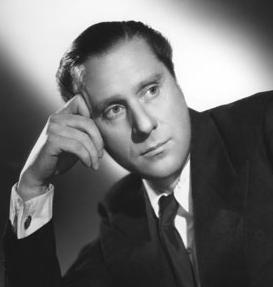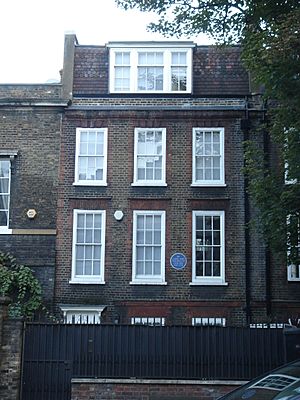Carol Reed facts for kids
Quick facts for kids
Carol Reed
|
|
|---|---|
 |
|
| Born | 30 December 1906 |
| Died | 25 April 1976 (aged 69) Chelsea, London, England
|
| Occupation |
|
| Years active | 1935–1972 |
| Spouse(s) |
Diana Wynyard
(m. 1943; div. 1947)Penelope Dudley-Ward
(m. 1948) |
| Children | 1 |
| Parent(s) | Herbert Beerbohm Tree (father) |
| Relatives |
|
Sir Carol Reed (born December 30, 1906 – died April 25, 1976) was a famous English film director and producer. He is known for directing classic movies like Odd Man Out (1947), The Fallen Idol (1948), and The Third Man (1949). He also directed the musical Oliver! (1968), for which he won an Academy Award for Best Director.
His film Odd Man Out was the first to win the BAFTA Award for Best British Film. The Fallen Idol won the same award the next year. The British Film Institute even called The Third Man the greatest British film of the 20th century!
Contents
Early Life and Start in Film
Carol Reed was born in Putney, a part of southwest London. His father was the well-known actor and producer Herbert Beerbohm Tree. Carol's mother was Beatrice May Pinney. He went to school at The King's School, Canterbury.
He started acting when he was a teenager. Later, he worked for the thriller writer Edgar Wallace as his personal assistant. Reed helped adapt Wallace's stories for movies. He also worked as a stage manager for plays.
After Wallace passed away, Reed joined Associated Talking Pictures. He learned a lot there, working as a dialogue director and assistant director. He helped with films like Autumn Crocus and Lorna Doone.
First Movies as Director
Carol Reed's first films as a director were often called "quota quickies". These were low-budget movies made quickly to meet rules about showing British films. His first solo film was Midshipman Easy (1935). Reed later said he felt unsure and made mistakes while making it. He realized that making mistakes was the best way to learn.
However, film critic Graham Greene praised Reed's early work. He said Reed had a better understanding of filmmaking than many older British directors. Greene especially liked Reed's comedy Laburnum Grove (1936). He called it a film that could be "unreservedly praise[d]". Greene saw great potential in Reed, believing he would become a very skilled director.
Reed's career really took off with The Stars Look Down (1940). This film was based on a novel by A. J. Cronin and starred Michael Redgrave. Graham Greene wrote that Reed "magnificently took" his chance with this film. He noted that Reed was excellent at directing actors, making them seem like real people.
Filmmaking During the War
During World War II, many of Reed's film scripts were written by Frank Launder and Sidney Gilliat. They worked for producer Edward Black. Some of their most famous films from this time include Night Train to Munich (1940), starring Rex Harrison. He also directed Kipps (1941) with Michael Redgrave again. Another notable film was The Young Mr. Pitt (1942), which starred Robert Donat and was set during the French Revolutionary and Napoleonic Wars.
From 1942, Reed joined the Royal Army Ordnance Corps. He became a Captain and worked with the army's film unit. He helped make training films for soldiers. One such film was The New Lot (1943), which showed the experiences of new army recruits. This film was later remade as The Way Ahead (1944).
Famous Post-War Films
After the war, Carol Reed made his three most highly praised films. The first was Odd Man Out (1947), starring James Mason. It tells the story of an injured Irish leader's final hours in a city in Northern Ireland. The city in the film is not named, but parts were filmed in Belfast. The famous director Roman Polanski has often said this is his favorite film.
Reed then signed with producer Alexander Korda. Korda introduced Reed to the novelist Graham Greene. Reed and Greene worked together on two more great films: The Fallen Idol (1948) and The Third Man (1949).
The Third Man was made with both Alexander Korda and American producer David O. Selznick. It starred American actors Orson Welles and Joseph Cotten. Reed really wanted Orson Welles to play the character Harry Lime. The film was shot in Vienna, Austria, for six weeks. While there, Reed discovered Anton Karas, a zither player. Karas's unique music became the famous soundtrack for the film.
Film critic Derek Malcolm called The Third Man the "best film noir ever made out of Britain." The film won the Grand Prix at the Cannes Film Festival, which is like the top prize there.
Later Career Highlights
Some people think Reed's creative work started to change after Outcast of the Islands (1952), a film based on a novel by Joseph Conrad. His film The Man Between (1953) was seen by some as too similar to The Third Man. A Kid for Two Farthings (1955) was Reed's first film made in color. It showed life in the East End of London. This was the last film Reed made for Alexander Korda, who passed away in 1956.
Trapeze (1956) was Reed's first movie using the wide screen CinemaScope format. It was filmed mostly in Paris and was a success at the box office. He worked with Graham Greene again on Our Man in Havana (1959), based on Greene's own novel.
Reed was supposed to direct a remake of Mutiny on the Bounty (1962). But there were problems with the main actor, Marlon Brando, and the weather. Brando wanted a lot of control over the film, and he and Reed disagreed often. Reed left the project early and was replaced by another director.
His biggest success later in his career was Oliver! (1968). This musical was filmed at Shepperton Studios in Surrey. It won the Academy Award for Best Director for Reed. Many people loved the movie, even if it had a very grand production style.
Personal Life and Legacy
Carol Reed was married twice. From 1943 to 1947, he was married to British actress Diana Wynyard. After they divorced, he married actress Penelope Dudley-Ward in 1948. They had one son named Max. His stepdaughter, Tracy Reed, also became an actress. The famous actor Oliver Reed was Carol Reed's nephew.
In 1952, Carol Reed became only the second British film director to be made a knight. This means he was given the title "Sir" for his amazing work in movies. The first director to be knighted was Sir Alexander Korda in 1942, who produced some of Reed's best films.
Sir Carol Reed passed away from a heart attack on April 25, 1976, when he was 69 years old. He died at his home in Chelsea, where he had lived since 1948. He is buried in Kensington Cemetery in West London. A special blue plaque has been placed on his former home to honor him.
Selected Filmography
| Year | Film | Notes |
|---|---|---|
| 1935 | Midshipman Easy | |
| 1936 | Laburnum Grove | |
| 1937 | Talk of the Devil | Also writer |
| Who's Your Lady Friend? | ||
| 1938 | Penny Paradise | |
| Bank Holiday | ||
| 1939 | Climbing High | |
| A Girl Must Live | ||
| 1940 | The Stars Look Down | |
| Girl in the News | ||
| Night Train to Munich | ||
| 1941 | Kipps | |
| A Letter from Home | ||
| 1942 | The Young Mr. Pitt | |
| We Serve | Recruiting film produced by Verity Films for the ATS. | |
| 1943 | The New Lot | |
| 1944 | The Way Ahead | |
| 1945 | The True Glory | Uncredited |
| 1947 | Odd Man Out | Also producer BAFTA Award for Best British Film |
| 1948 | The Fallen Idol | Also producer New York Film Critics Circle Award for Best Director BAFTA Award for Best British Film Nominated—Academy Award for Best Director |
| 1949 | The Third Man | Also producer Grand Prize of the Cannes Film Festival BAFTA Award for Best British Film Nominated—Academy Award for Best Director |
| 1952 | Outcast of the Islands | Also producer |
| 1953 | The Man Between | Also producer |
| 1955 | A Kid for Two Farthings | Also producer |
| 1956 | Trapeze | |
| 1958 | The Key | |
| 1959 | Our Man in Havana | Also producer |
| 1963 | The Running Man | Also producer |
| 1968 | Oliver! | Academy Award for Best Director 6th Moscow International Film Festival - Special Prize Nominated—BAFTA Award for Best Film Nominated—BAFTA Award for Best Direction |
| 1970 | Flap | |
| 1972 | Follow Me! |
See also
 In Spanish: Carol Reed para niños
In Spanish: Carol Reed para niños
 | Lonnie Johnson |
 | Granville Woods |
 | Lewis Howard Latimer |
 | James West |


